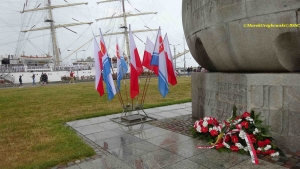Joseph Conrad – an English marine writer with Polish roots







 By Marek Grzybowski
By Marek Grzybowski
On August 3, 2023, almost 100 years have passed since Joseph Conrad, a world-famous seafarer with Polish roots, passed away on the English soil. For Poles, it has been Józef Conrad Korzeniowski for many years, although he is not widely known under this name in the world.
On the occasion of the 100th anniversary of the death of this outstanding writer, POSK – the Polish Social and Cultural Center in London – organized an exhibition dedicated to the writer. Numerous memorabilia, photos and memoirs as well as several editions of Conrad’s books in various languages have been collected. The writer’s writing workplace from his home in Oswalds has been recreated.
For many years, representatives of the Polish Nautological Society, the City Council of Gdynia and the City Library have been laying flowers at the monument of Józef Conrad Korzeniowski every year to commemorate the famous seafarer. Joseph Conrad died on August 3, 1924 in Oswalds near Canterbury, England.
It is good that his greatest monument is in Gdynia, a city that was built at the junction of the sea and dreams. It is good that local government officials and representatives of social organizations remember about it.



From Krakow to the Mediterranean Sea
Józef Teodor Konrad Korzeniowski was born in December 1857 in Berdyczów. This world-famous seafarer, author of many books and stories, left Poland as a boy from Kresy with a dream to enlist on a sailing ship. He chose the French flag. He studied in Lviv, then in Krakow. He did not finish high school. He was the son of Ewa and Apollo Korzeniowski. Father was an exile. He and his wife were sent to Wologda for participating in the preparations for the January Uprising. Then the family moved to Chernihiv.
Although he was a subject of the Tsar of Russia, he chose the French flag. As mentioned, he did not complete his studies. At the age of 17, he went to Marseille because, according to his biographers, he spoke French as fluently as a Frenchman. After his first voyage as a passenger, he signed on a sailing ship.
He gained sailing experience as an apprentice and steward. Since he could not sail on French ships without the permission of the tsarist authorities, after 3 years he moved under the British flag. While sailing on English ships, he obtained a captain’s license in 1886. In the same year he became a subject of Queen Victoria.
He went ashore and published his first book before he was 40. “Almayer’s Folly” is Korzeniowski’s first book published under the name Joseph Conrad, which he assumed when he moved to Albion. He married in 1886 to eighteen-year-old Englishwoman Jessie George and had two sons, Alfred Boris and John Alexander. He sailed until 1994 on various vessels, including river vessels in Africa.




Conrad’s writing style
In English literature, it is customary to talk about Conrad’s writing style, which was quite widely adopted by many writers in a certain era. There were those who openly admitted that they drew on Konrad’s approach to facts and characters and modeled on his way of narration. Among them were: Francis Scott Fitzgerald, William Faulkner, William S. Burroughs, Saul Bellow, Philip Roth, or Joan Didion and Thomas Pynchon.
In the world, Conrad is associated with school readings, in which such famous titles as: “Lord Jim”, “Heart of Darkness” or “Nostromo” appeared.
As a background for his novels and short stories, the writer chose the exotic Javanese Archipelago, then, and even today, a little-known area. Conrad consciously chose this region for the background of his novels, because for the English these areas were still exotic.
In many novels, Conrad described real characters, which he embellished literary. He became so skilled that he was recognized as one of the stylists of British literature.
Fascinated by Conrad – – Conrad in literature, theatre, film and computer
Many ships and yachts with the name “Conrad” on the side sailed the seas. There are shipyards and workplaces, schools and libraries, as well as associations commemorating the achievements of the novelist, playwright and, above all, a mariner. Conrad’s achievements and works were and still are fascinated not only by mariners and literary scholars.
In addition to dozens of film and theater adaptations, comic books and a computer game were also created. The authors of many works also refer to Conrad’s novels and heroes. In the series of films “Alien” the names of ships and ships are directly transferred from the pages of Conrad’s novels.
This is thanks to people fascinated by the achievements of an English writer with a Polish soul and, as many people point out, who speaks English with a strong Polish accent. On the fiftieth anniversary of Conrad’s death, a collection of critical and literary studies by authors from all over the world was published. Writers from all over the world have written critical studies and analyzes about Conrad’s work. The work is over eight hundred pages long. Since then, the number of such studies has at least doubled.
“Aleksander Janda-Połczyński organized the publication of the biography “Conrad the Living”, which in 1957 in London was sponsored by the Union of Polish Writers Abroad” – recalls Prof. Daniel Duda. “The Polish Nautological Society continues its popularizing activity in the environment of schools and universities” – says Marek Grzybowski, president of the Polish Nautological Society. . The meeting at the Conrad Monument is an opportunity to talk about the roots of Maritime Poland and the world’s maritime literature.





Conrad Monument in Gdynia
“The monument was created, among others, on the initiative of the Polish Nautological Society – recalls Prof. Daniel Duda, honorary president of the Polish Nautological Society. Laying the cornerstone was a modest ceremony. The unveiling in 1976 took place with the participation of the highest authorities.
The authors of the Conrad Monument are Zdzisław Koseda and Wawrzyniec Samp. Behind the bust of the writer, stylized masts with sails were placed, referring to the “Otago” barge.
Józef Korzeniowski from the Polish Berdyczów, where he was born on December 3, 1857, traveled to the English Bishopsbourne through lands, seas and rivers. He came to our hearts thanks to novels and short stories. He found his way into world literature as a seafarer, a documentalist of his times, the creator of a specific style of narration and composition of the message written in prose.
Photo: Marek Grzybowski, Czesław Dyrcz
